
Please note our upcoming symposium “Social Impact of Audiovisual Media” – 12th – 13th August 2021 (12th: 4 – 8 PM CEST, 13th: 11 AM – 5 PM CEST):
Latest research and knowledge exchange news at Bournemouth University

Please note our upcoming symposium “Social Impact of Audiovisual Media” – 12th – 13th August 2021 (12th: 4 – 8 PM CEST, 13th: 11 AM – 5 PM CEST):


In the recent months, Bournemouth University have been in negotiation with Taylor and Francis through JISC to sign up to the latest JISC Read and Publish deal and last week, the process was finalised and Bournemouth University officially became a member of this deal.
In theory, this means that Bournemouth University authors can now publish for free in any of the Open Select Taylor and Francis titles. However, due to a recent ruling by the HMRC on the publisher, all HEIs are being charged 20% VAT for every article that is approved for publication.
The implication of this is that if you are looking to publish in an Open Select title with Taylor and Francis, and you wish to make your article Open Access through this deal, you will still be required to submit an application to the BU Open Access fund through the normal route. This is due to the fact that BU will still have to cover the 20% VAT incurred from each article; we therefore need to ensure that we have the funds to cover these articles before approvals can be processed.
For more information and author guidance on this latest deal, please see the link below:
Alternatively, if you have more questions about this deal, please email OpenAccess@bournemouth.ac.uk.
This is a reminder that on Thursday 22nd July 2021 from 2-4pm, RDS will be hosting a virtual STEAMLab event under the strategic investment area (SIA) of Medical Science.
Please apply for a space by 5pm Monday 14th June. 
We ask all participants to download and complete the Application Form and return this to Lisa Andrews.
For more information, please see our previous blog post.
If you have any queries prior to submitting your application, please contact RDS Research Facilitators Lisa Andrews or Ehren Milner.
On Tuesday, 6th July 2021, 9-11 AM, Bournemouth University will host a virtual STEAMLab event on Global Challenges, attended by staff from the Northeastern University (NEU) in China.
Which means…?
We’re seeking to come up with novel research that relates to UN Sustainable Development Goals, which underpin BU2025 strategy and much of the technological research at NEU.
So, who should attend?
We want anyone who thinks they might have something to contribute, to come along. We will also be inviting relevant external attendees to contribute to the day. We welcome academics, NGO/business/government representatives who wish to contribute to having a positive impact through addressing the world’s global challenges.
What do I need to prepare in advance? What will the sandpit entail?
Absolutely nothing in advance. During the STEAMLab, you’ll be guided through a process which results in the development of research ideas. The process facilitates creativity, potentially leading to innovative and interdisciplinary research ideas. These ideas will be explored with other attendees, and further developed based on the feedback received.
What if I don’t have time to think about ideas in advance?
You don’t need to do this. Some inspiring speakers with a range of backgrounds will be coming along to give you ideas…
What about afterwards? Do I need to go away and do loads of work?
Well… that depends! The STEAMLab will result in some novel research ideas. Some of these may be progressed immediately; others might need more time to think about. You may find common ground with other attendees which you choose to take forward in other ways, such as writing a paper or applying for research funding. Support will be available to progress project ideas after the day.
What if my topic area is really specific, such as health?
Your contribution will be very welcome! One of the main benefits of a STEAMlab event is to bring together individuals with a range of backgrounds and specialisms who are able to see things just that bit differently to one another.
So, is this just networking?
Definitely not! It is a facilitated session with the primary intention of developing innovative research ideas, which also enables the development of networks. It gives you the opportunity to explore research ideas which you may develop over time, together with the chance to find common ground with academics from across BU and beyond.
So, how do I book onto this event?
To take part in this exciting opportunity, all participants should complete the Global-challenges-STEAMLab-Application-Form_2021 and return this to GlobalBU@bournemouth.ac.uk. Places are strictly limited and you will be be contacted to confirm a place place on the STEAMLab with arrangements and meeting invitations nearer the time.
If you have any queries prior to submitting your application, please contact Dr. Sarah Price.

According to BU’s Publications Policy and Procedures, on acceptance of publication by the publisher, all BU authors should record all research outputs in BRIAN immediately, and no later than three months after this point. For journal articles and conference proceedings, to comply with the REF Open Access policy, all BU authors should ensure that the author-accepted-manuscript (full text) is also deposited in BRIAN at the same time, and no later than three months after this point.
To do so, after you’ve created your publication record, click on the blue arrow up icon to deposit your full text –

You will then be directed to a page where the terms and conditions associated with the deposit will be made clear, before you proceed with choosing your file to be uploaded –
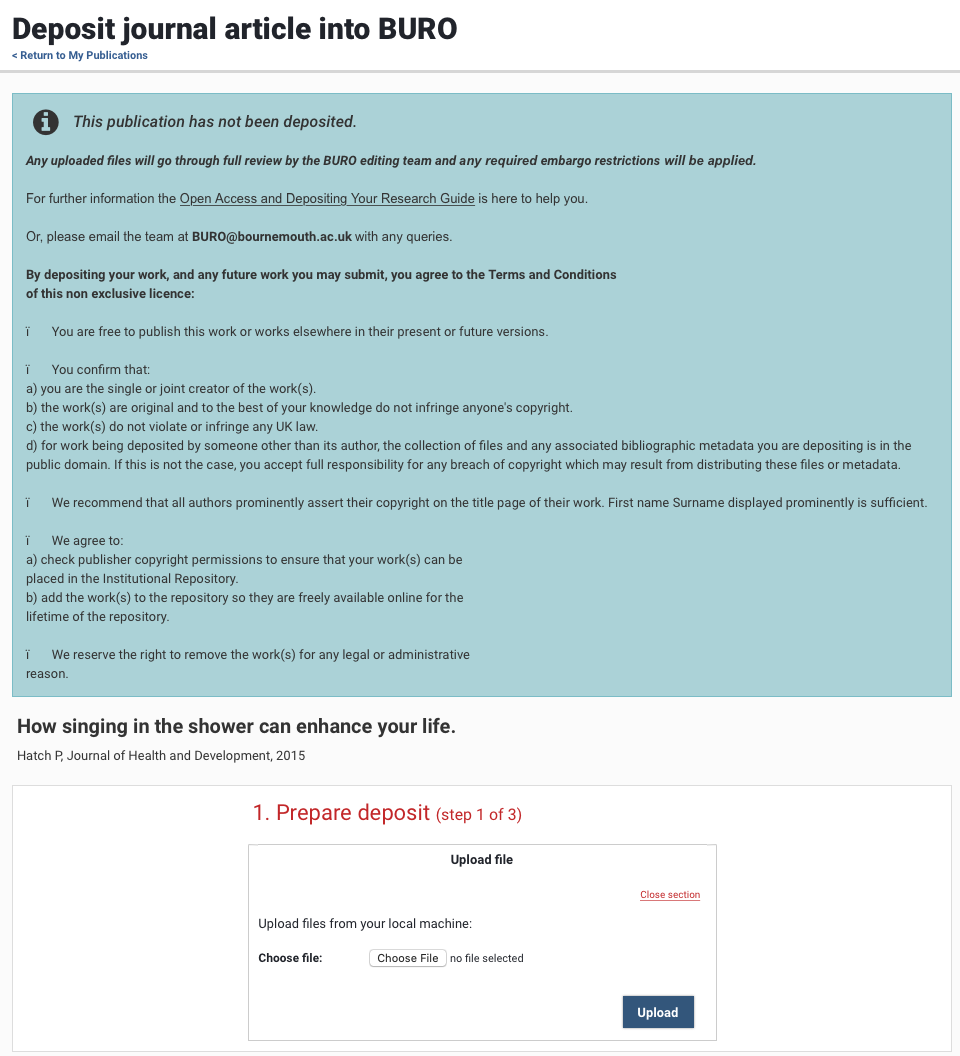
After you’ve uploaded your full text, it will then go through a review process by one of the Bournemouth University Research Online (BURO) team members with the Library and Learning Support Team. This is to ensure first of all, that the correct version of the full text has been uploaded; and depending on the publisher copyright policy, an embargo period may be imposed on the full text before it is visible to the public. If there are any problems with the deposit, one of the BURO teams members will contact the author directly to resolve the issue.
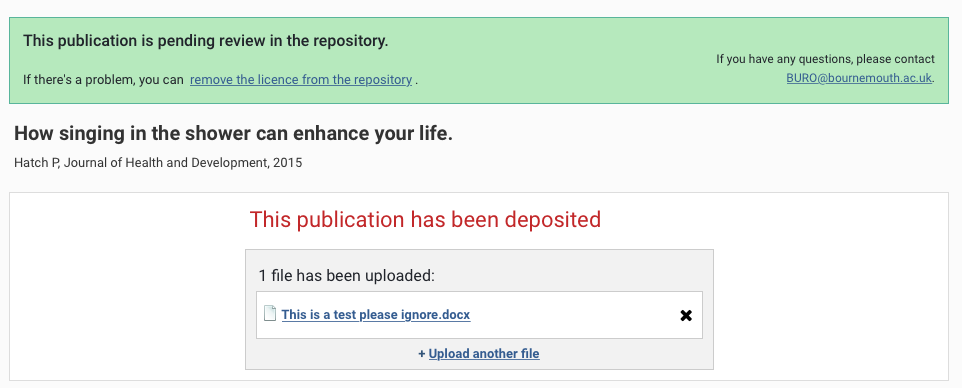
Once the full text has been reviewed and processed by the BURO team, it will then be deposited into our institutional repository (IR), which is Bournemouth University Research Online (BURO) and you would have complied with BU’s open access policy. In BURO, you will find all full texts deposited by other BU authors and you can browse the content by year, group or author (surname); and if you’re interested, you can also view the repository statistics in terms of the number of total outputs deposited, their breakdown by type, or you can even check out the most downloaded items from our repository!
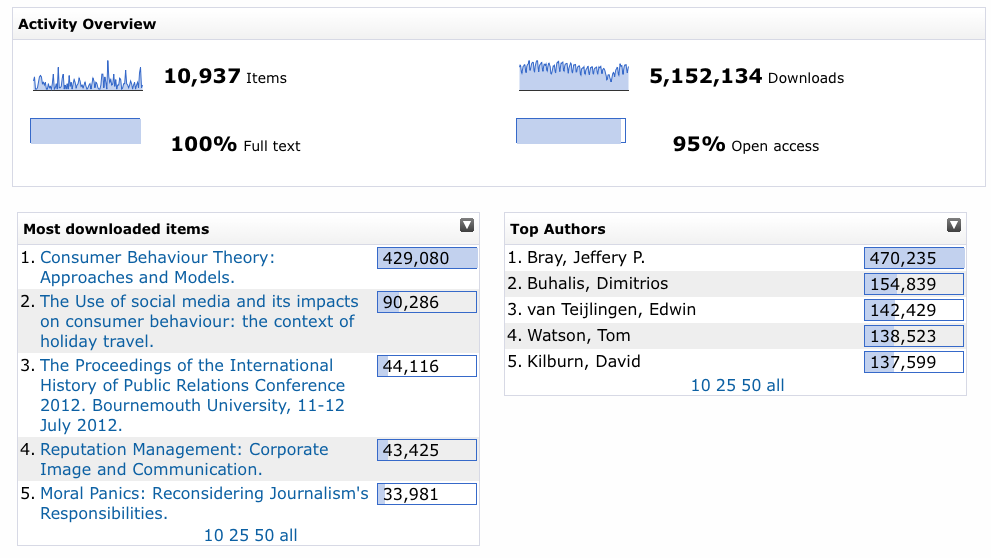
After your full text has been deposited into BURO, if you have a BU Staff Profile Page, the link to the full text will also appear under your publication record on your Staff Profile Page and it will look like this –

Any visitor to your Staff Profile Page can then click on the link and be directed straight to your full text in BURO read all about your research.
If you have any further queries, please don’t hesitate to email either BRIAN@bournemouth.ac.uk, BURO@bournemouth.ac.uk or OpenAccess@bournemouth.ac.uk
 On Thursday 22nd July 2021 from 2-4pm, RDS will be hosting a virtual STEAMLab event under the strategic investment area (SIA) of Medical Science. It will be the third of a series to 2-hour long virtual STEAMLabs to be held in the course of 2021.
On Thursday 22nd July 2021 from 2-4pm, RDS will be hosting a virtual STEAMLab event under the strategic investment area (SIA) of Medical Science. It will be the third of a series to 2-hour long virtual STEAMLabs to be held in the course of 2021.
The ideas generated at this event may also be used to help select colleagues for further Scramble events at short notice.
Booking onto this event
To take part in this exciting opportunity, we ask all participants to download and complete the Application Form and return this to Lisa Andrews by Monday 14th June.
By applying, you agree to attend for the full duration of the event on 22nd July from 2pm – 4pm. Places at the event are limited and you will be contacted to confirm your “virtual space” by 21st June 2021
If you have any queries prior to submitting your application, please contact RDS Research Facilitators Lisa Andrews or Ehren Milner.
The Brief
We’re seeking to come up with highly innovative and urgently required research which is ambitious in scope and will require a high level of expertise, commitment and funding. The research must address challenges in the field of Medical Science.
In short, we anticipate the development of innovative, ground-breaking cross-disciplinary and ambitious projects which have the capacity to attract significant, high value external funding from the public and private sectors in the future.
We would also like to use this opportunity to further collaborations with our local clinical colleagues, and are delighted to be welcoming a number of attendees from local NHS Trusts to join us at this event.
Who should attend?
We welcome those who wish to contribute to having a positive impact through addressing scientific challenges, but in particular, we are specifically targeting the following:
Some Answers to your FAQs:
Do I need to do anything in advance?
During the STEAMLab, you’ll be guided through a process which results in the development of collaborative research ideas. To aid us in this process, we will be using the platform Padlet to discuss and share ideas on a number of research themes ahead of the event. This will enable us to identify the themes of the day by asking you as the attendees to contribute your thoughts and ideas ahead of the STEAMLab.
What is the immediate objective?
The objective by the end of the STEAMLab is to have scoped some leading and grand ideas around which a working group or cluster can be formed to take forward towards the development of a large grant application. This event is run to facilitate new interdisciplinary research collaborations.
What do I need to do afterwards?
Your project idea may be “oven-ready”, but it is more likely that you/your group’s project idea/s will require some time to crystallise fully, and for the optimum partners to be found for the building a winning consortium. To this end, it is envisaged that you and your potential collaborators will be committed to meeting on a regular basis, with a firm timetable.
What if my topic area is very specialised, within fields such as medical diagnostics or environmental science?
Your contribution will be very welcome! One of the main benefits of a STEAMLab event is to bring together individuals with a range of backgrounds and specialisms who are able to see things just that bit differently to one another.

Open access is a broad international movement that seeks to grant free and open online access to academic information, such as publications and data. A publication is defined ‘open access’ when there are no financial, legal or technical barriers to accessing it – that is to say when anyone can read, download, copy, distribute, print, search for and search within the information, or use it in education or in any other way within the legal agreements.
Bournemouth University is unfortunately not a current recipient of the UKRI Open Access block grant. However, there is a small centralised BU Open Access Fund that BU authors can get access to on a competitive basis. Due to a very limited budget, application for funding is extremely competitive, and the selection criteria are stringent. In the past years, through the centralised open access fund, Bournemouth University has been able to support open access outputs from various impactful key research, including Epibentic and mobile species colonisation of a geo textile artificial sur reef on the south coast of England, Dignity and respect during pregnancy and childbirth: A survey of the experience of disabled women, Seven Characteristics Defining Online News Formats, Applied screening tests for the detection of superior face recognition, and many more!
Through the UK JISC Agreements, Bournemouth University currently has Read and Publish open access transformative deals with publishers such as BMJ, SAGE, Springer and Wiley, which means that BU authors can publish open access for free in the journal titles covered under the deals, subject to their terms and conditions. Each transformative deal and what it covers varies from one another. For example, the BMJ transformative deal only covers original research articles from research funded by UKRI, British Hearth Foundation, Blood Cancer UK, Cancer Research UK, Parkinsons UK, Versus Arthritis or the Wellcome Trust. As for the SAGE transformative deal, there is no such restrictions; however, you can only publish open access for free under a select list of journal titles.
In order to ensure that you get the maximum benefit from these transformative deals, do head over to the Bournemouth University Library and Learning Support guide for more details and information!
Green Open Access, also referred to as self-archiving, is the practice of placing a version of an author’s manuscript into a repository, making it freely accessible for everyone. The version that can be deposited into a repository is dependent on the funder or publisher. You can make use of the Sherpa Romeo online resource to check the copyright policies of your target journal or publisher. At Bournemouth University, the self-archiving process is done through our current research and information system called BRIAN (Bournemouth Research Information and Networking); and all successfully reviewed and deposited manuscripts will be housed in our institutional repository called BURO (Bournemouth University Research Online).
Stay tuned for the next segment where we’ll be talking more about “Open Access @ BU & how it works!”
This journal paper, ‘“Is it realistic?” the portrayal of pregnancy and childbirth in the media‘, was published in 2016 in the Open Access journal BMC Pregnancy & Childbirth [1]. This interdisciplinary and cross-faculty BU paper was initially rejected by two media journals that didn’t seem to value systematic reviews as a method in their discipline. In 2016 BU funded the cost of Open Access publishing in BMC Pregnancy & Childbirth. The paper has since been cited 50 times in SCOPUS (measured 11 May 2021); it has been submitted to REF 2021 in two different Units of Assessment – Allied Health Professions, Dentistry, Nursing and Pharmacy and Communication, Cultural and Media Studies, Library and Information Management.
Being Open Access, the paper has reached scholars outside the health field, as it has been cited not only in many health journals but also in media journals such as Discourse & Communication, International Journal of Sport Communication or Critical Studies in Media Communication as well as in Feminist journals such as Feminism & Psychology or more Anthropological journals such a European Journal of Cultural Studies .
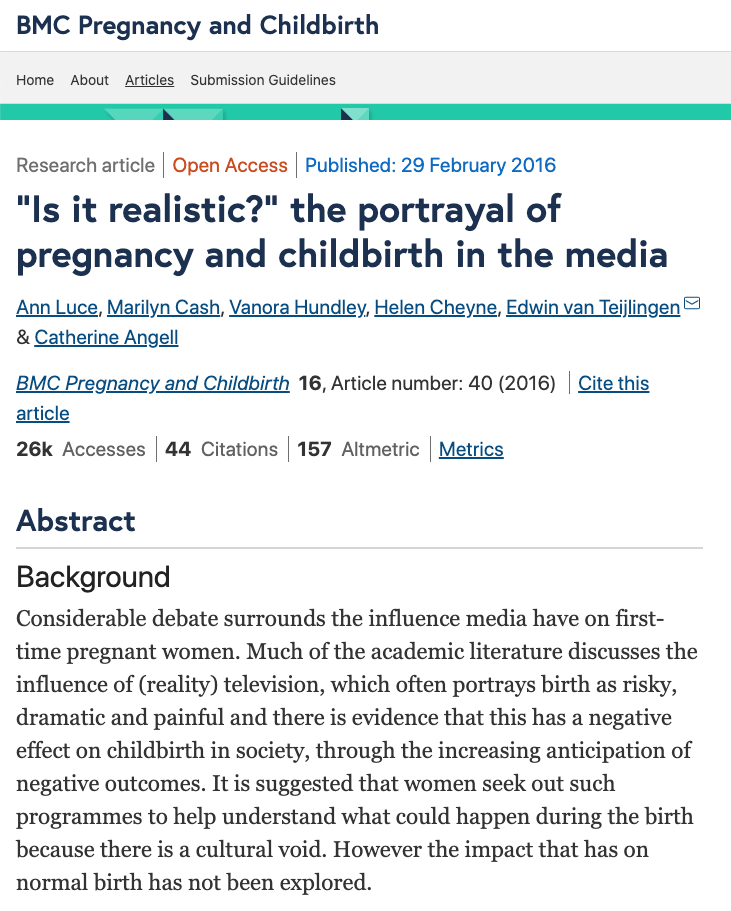
ResearchGate, the professional network for over 20 million scientists and researchers from all over the world, informed the authors last month (27 April 2021) that ‘“Is it realistic?” the portrayal of pregnancy and childbirth in the media‘ has been read 1,000 times.

Professor van Teijlingen believes that the success of Open Access publishing is often in the longer-term. Between a paper getting published and being cited by fellow academics can easily take some years. Funding Open Access publications is a long-term investment by BU.
Reference:
Luce, A., Cash, M., Hundley, V. et al. “Is it realistic?” the portrayal of pregnancy and childbirth in the media. BMC Pregnancy Childbirth 16, 40 (2016). https://doi.org/10.1186/s12884-016-0827-x
If you have any Open Access success stories that you would like to share, please do get in touch with pphatch@bournemouth.ac.uk

Do you want to know more about what open access publishing means at BU and how it works? The Bournemouth University Library and Learning Support LibGuide provides a single source of information where you can find relevant topics on open access such as ‘Depositing your research’, ‘Copyright and Licenses’, ‘Open Access Funding’, ‘Predatory publishers’, so on and so forth.
So head over to the page now, and learn more about open access publishing @ BU!
https://libguides.bournemouth.ac.uk/c.php?g=471706&p=3226076
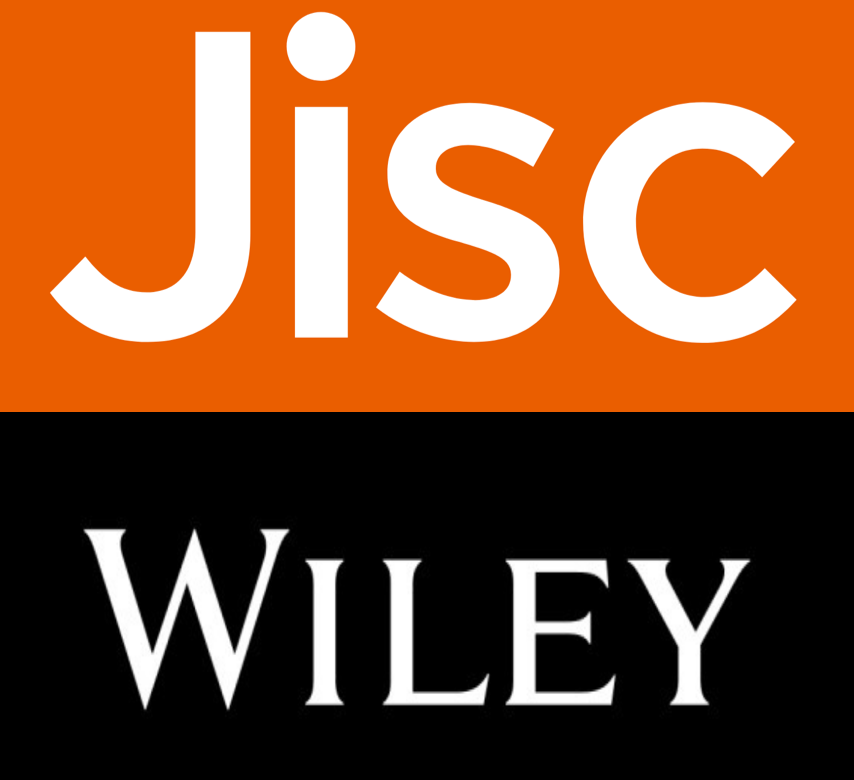
We have been informed that the Wiley Jisc read and publish agreement overall fund has been drawn down more quickly than initially projected. As a result, Wiley has estimated that restrictions will need to be introduced at the end of June 2021 which limits OA publishing to UKRI/Wellcome funded articles only.
This has not yet been confirmed, and Wiley will continue to monitor the fund but this is an early warning that some sort of restrictions will be placed on the Wiley-Jisc read and publish agreement later in the year.
**Article originally published on WonkHE.com**
When Martin Eve had a stroke five years ago, paywalls prevented him researching his condition. He argues that the current system is patronising, elitist, and needs to change.
This is Martin’s view on open access publishing —
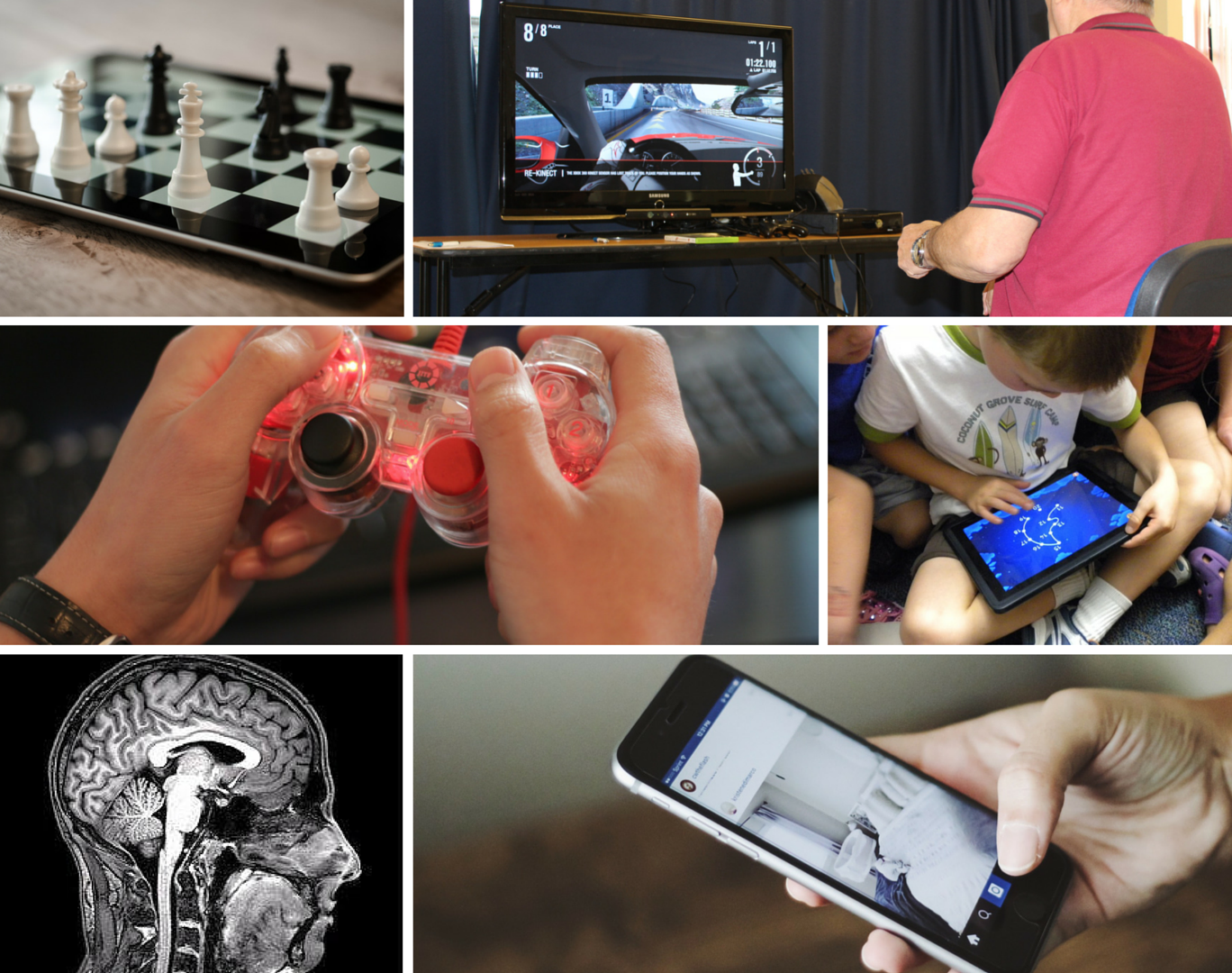
I had a stroke half a decade ago and found I couldn’t access the medical literature on my extremely rare vascular condition.
I’m a capable reader, but I couldn’t get past the paywalls – which seemed absurd, given most research is publicly funded. While I had, already, long been an open access advocate by that point, this strengthened my resolve.
The public is often underestimated. Keeping research locked behind paywalls under the assumption that most people won’t be interested in, or capable of, reading academic research is patronising.
More than half (50.2 per cent) of the UKs 18- to 30-year-olds now go to university.
These students and graduates, and many others across the population, are able readers who can navigate research materials in their field. To say that there isn’t a public appetite for academic research is a stalling technique from publishers, designed to slow progress towards full open access. What we need is easy access to scholarly output so that people, whether they’re working from home, hospital, or anywhere else, can get digital open access.
But open access does come with its challenges. As an early career researcher, I was given the conflicting choice of publishing in a prestigious venue that would advance my career, against publishing in open access journals that often don’t have an established reputation. This is a common conundrum – and, of course, many take option A.
Even though the Declaration on Research Assessment (DORA) has opened the discussion about how researchers and the outputs they produce are evaluated, there’s still a lot to be done to swing perceptions of the ‘best venues’ for publishing research. Regardless of how much we want to believe that DORA has influenced how selection committees appoint researchers, if you want to get an academic job, being published in a prestigious journal can still provide a golden ticket.
While this moral quandary should not be passed to young researchers, there may be benefits to them in taking a firm stance. Early career researchers are less likely to have grants to pay for article processing charges to make their work open access compared to their senior colleagues. Early career researchers are also the ones who are inadvertently paying the extortionate subscription fees to publishers. According to data from the Higher Education Statistics Agency (HESA), the amount of money UK universities fork out each year to access paywalled content from Elsevier – the largest academic publisher in the world – could pay 1,028 academic researchers a salary of £45,000 per year.
We know for-profit publishers, such as Elsevier, hold all the cards with respect to those prestigious titles. What we need are systematic “read and publish” deals that allow people to publish where they want without having to find funding for open access.
Currently, UK universities, supported by Jisc, are in negotiations with Elsevier. Working on behalf of researchers and students, universities have two core objectives: to reduce costs to levels they can sustain, and to provide full and immediate open access to UK research.
However, there are some problems – not least cost. Most libraries already pay around 30 percent of their budget to Elsevier, and price of “agreements” continue to rise. An agreement with Elsevier can only be truly “open” if universities like mine can afford to participate in them.
The current outlook for prospective researchers to secure an academic position at a university is compromised because so much money is spent propping up for-profit, commercial publishers. Rather than focusing on career damage to those who can’t publish with an Elsevier title, we should focus on the opportunity cost in hundreds of lost careers in academia.
We often say early career researchers struggle to take risks, but I did – and I was then appointed as the youngest professor of English in the UK. If you’re willing to make a stand on open access, it can create opportunities.
My passion for open access was ignited when I was a PhD student, but it hasn’t held me back in my career. Six of my seven published books are open access, and three more are in the pipeline that will be published open access. I have also secured agreement to make that first book OA retrospectively. All my conference papers are freely accessible too. I may be the humanities author with the most open access monographs in the world – and I live in this open access world because I’ve made an ethical career choice to do so.
There’s not enough focus on this worthwhile cause that benefits society. I get frustrated by people who only see the negatives of open access and just want to continue the status quo. We are already living in an open access world if you choose it.
The sector’s negotiations with Elsevier should be thought of in that spirit. The world is ready for open access, and I hope that Elsevier will catch up. Otherwise, they’ll become a relic to leave behind as we consider what we really want from research dissemination.
 This is a reminder that on Wednesday, 12 May 2021 from 11.30am to 1pm, RDS will be hosting Virtual STEAMLab event under the strategic investment area of Assistive Technology.
This is a reminder that on Wednesday, 12 May 2021 from 11.30am to 1pm, RDS will be hosting Virtual STEAMLab event under the strategic investment area of Assistive Technology.
Please booking your place by the end of Wednesday, 5 May 2021.
We ask all participants to download and complete the AT STEAMLab Application Form and return this to Ainar Blaudums and/or Theresa McManus.
For more information please read our previous AT STEAMLab blog post.
If you have any queries prior to submitting your application, please contact RDS Research Facilitators Ainar Blaudums or Ehren Milner.
We are looking forward to meeting you at the STEAMLab next week.
At the risk of needling you with yet another blogpost regarding our exciting Strategic Investment Areas Game-Changing Ideas call for Expressions of Interest (closing 30 April), RDS will take this opportunity to remind you that there are a further two drop-in sessions, on 19 and 22 April respectively: you can find the meeting links on the blogpost regarding these events here: https://blogs.bournemouth.ac.uk/research/2021/04/01/the-call-for-game-changing-research-concepts-is-currently-open/.
Tips on completion of the EoI will be dispensed at those events, which are entirely informal and also provide possible networking opportunities with others whose ideas may resonatewith yours and with whom you may consider strategically joining join forces.
Finally, should game-changing ideas crossover with one of the other SIAs (as they invariably will, if grand!), we can advise that there are two remaining SIA briefings: Assistive Technology on 22 April, 10.30am, and Sustainability, Low Carbon Technology and Materials Science on 23 April at 10.00am. For the session links, see https://blogs.bournemouth.ac.uk/research/2021/04/12/88688/
Do pitch up for an informal chat over how you can make your idea a winning one. We look forward to seeing you there!
 On Wednesday, 12 May 2021 from 11.30 to 1pm, RDS will be hosting Virtual AT STEAMlab (Science/Tech/Engineering/Arts/Maths lab) event under the strategic investment area (SIA) of Assistive Technology (AT). It will be the second of a series of up to 2-hour long virtual STEAMlabs to be held in the course of 2021.
On Wednesday, 12 May 2021 from 11.30 to 1pm, RDS will be hosting Virtual AT STEAMlab (Science/Tech/Engineering/Arts/Maths lab) event under the strategic investment area (SIA) of Assistive Technology (AT). It will be the second of a series of up to 2-hour long virtual STEAMlabs to be held in the course of 2021.
The ideas generated at this event may also be used to help select colleagues for further Scramble events at short notice.
Booking onto this event
To take part in this exciting opportunity, we ask all participants to download and complete the AT STEAMLab Application Form and return this to Ainar Blaudums by Wednesday, 5 May 2021.
By applying, you agree to attend for the full duration of the event on 12 May from 10:30am to 1pm. Places at the event are limited and you will be contacted to confirm your “virtual space” by 7 May 2021.
If you have any queries prior to submitting your application, please contact RDS Research Facilitators Ainar Blaudums or Ehren Milner.
The Brief
 We’re seeking to come up with highly innovative and urgently required research which is ambitious in scope and will require a high level of expertise, commitment and funding. The research must address challenges in the AT field.
We’re seeking to come up with highly innovative and urgently required research which is ambitious in scope and will require a high level of expertise, commitment and funding. The research must address challenges in the AT field.
In short, we anticipate the development of innovative, ground-breaking cross-disciplinary and ambitious projects which have the capacity to attract significant, high value external funding from the public and private sectors in the future.
Who should attend?
We welcome those who wish to contribute to having a positive impact through addressing scientific challenges, but in particular, we are specifically targeting the following:
We will also be inviting relevant external attendees, such as digital technology companies, to contribute on the day.
Some Answers to your FAQs:
Do I need to do anything in advance?
No, you do not. During the STEAMLab, you’ll be guided through a process which results in the development of collaborative research ideas. The process facilitates creativity, potentially leading to grand, innovative and interdisciplinary research. These ideas will be shared and explored with other attendees, and further developed based on the feedback received.
What is the immediate objective?
The objective by the end of the STEAMlab is to have scoped some leading and grand ideas around which a working group or cluster can be formed to take forward towards the development of a large grant application. This event is run to facilitate new interdisciplinary research collaborations.
What do I need to do afterwards?
 Your project idea may be “oven-ready”, but it is more likely than not that, given the level of pioneering innovation sought, you/your group’s project idea/s will require some time to crystallise fully, and for the optimum partners to be found for the building a winning consortium, and bringing to fruition a fully-fledged grant application. To this end, it is envisaged that you and your potential collaborators will be committed to meeting on a regular basis, with a firm timetable.
Your project idea may be “oven-ready”, but it is more likely than not that, given the level of pioneering innovation sought, you/your group’s project idea/s will require some time to crystallise fully, and for the optimum partners to be found for the building a winning consortium, and bringing to fruition a fully-fledged grant application. To this end, it is envisaged that you and your potential collaborators will be committed to meeting on a regular basis, with a firm timetable.
What if my topic area is very specialised, within fields such as medical diagnostics or environmental science?
Your contribution will be very welcome! One of the main benefits of a STEAMlab event is to bring together individuals with a range of backgrounds and specialisms who are able to see things just that bit differently to one another.
The meeting will be broadcasted LIVE on Facebook
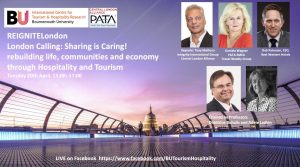
“Smart” homes, cities, and motorways, the Internet of Things, and Digital Twins are just some of the 21st century phenomena fast becoming – if not yet a ubiquitous reality on the (Western) ground – at least now common parlance, and no aspect of our lived experience and myriad environments remains untouched by such technologies. As you will be aware, your research – in whatever field you specialise – is not unaffected by these developments. Our Animation, Simulation and Visualisation (ASV) Network literally and virtually plugs into these digital drivers and interfaces, now forming an expanding transdisciplinary group populated by talented, research-active academics from all BU faculties and several research centres, and sharing a commitment to growing high-end, collaborative, fundamental and applied research at BU.
Included in the network are our internationally reputable National Centre for Computer Animation (NCCA) and the Disaster Management Centre (DMC) – both renowned for sterling achievements in their fields – and our more recently launched Institute for the Modelling of Socio-Environmental Transitions (IMSET), and Institute for Medical Imaging and Visualisation (IMIV), who already have a raft of invigorating projects in the pipeline. They are exemplars of the scope and impact of ASV-based or deployed research, and mentioned here to fire up your enthusiasm to explore ASV and ponder how this strategic investment area may be relevant to or harnessed for your research. The strategic mission of the ASV network is to orient the valuable research projects undertaken by BU academics, their partners and stakeholders towards current “real-world” problems which require innovative solutions.
Whether it is entertainment and the pandemic-induced move towards virtual production, the rapidly-evolving digitisation of education, public health or environmental crisis management, the democratisation of medical self-surveillance, state-of-the-art ASV medical diagnostics, AR/VR-enhanced surgical training, virtual access to natural and cultural heritage, inter alia, ASV features in much of the research and practices, products and outputs immanent to these areas of knowledge and expertise. As well as conceptualising, supporting and securing funding for transdisciplinary projects, the ASV network seeks to nurture ECRs and MCRs in their career progression and encourage BU academics to network and explore ambitious, mutually beneficial cross-fertilisations from an ASV perspective which they may not have considered previously.
If you wish to explore how you might become involved in the mission, aims and objectives of the ASV strategic investment area, and ascertain how you might strategically tailor your research for the common good by becoming part of this broad-based, vibrant and dynamic network, please contact me, Nicolette, at nbliebchen@bournemouth.ac.uk, or via MS Teams for an informal chat.
To pique your interest in the strategic investment areas in general, do have a look at the SIA Expression of Interest call for Game-Changing Concepts on the BU Research Blog (on which you shall also find the EoI template: deadline 30 April 2021)
A few days ago I noticed a post on the BU Staff Intranet about the Fourth Annual Global Goals Teach In, where, as educators, we can pledge to embed the UN Sustainable Development Goals in our teaching practice for 2 weeks between 22 February and 5 March 2021. It made my heart skip a beat thinking now is the time to make education more holistic! To not just arm our students with the best possible degree for their future careers but to empower them to be change makers.
Education is fundamental to shifting attitudes and make us feel we can be the change we want to see. The term ‘university entrepreneurship‘ is strongly in favour of the school of thought that enterprise development or entrepreneurial action is nurtured within the academic environment, allowing latent entrepreneurial ambitions to flourish! For the last few years I have been privileged to lead the Entrepreneurship and Business Ventures module in the final year at Bournemouth University Business School. Within the constraints of the time, curriculum and resources, we aim to run this module as a mini in-class incubation hub through ideation support; mentoring support through industry connections; guest speakers; networking events and many more. Each year, based on a personal commitment to sustainable collective action for the planet and humanity and spurred on by the encouraging global trends towards start-ups that espouse the triple bottom line (Economic, Social and Environmental), we designed a curriculum to support student entrepreneurship focusing on the economic viability centred around social/environmental sustainability. Because sustainability makes business sense, it is not merely altruism, it leads to competitive advantage, earning newer market segments and creates longevity and legacy for a business.
The UN SDGs make the task of embedding a sustainability agenda in the curriculum easier to do and also easier to understand the trajectory in which our small steps can add to the solutions of the grand problems. Often the discussions on sustainability, from a small business perspective, sounds like a costly goal to achieve and in this difficult economic times, sounds like an absurd suggestion when businesses cannot even survive the external forces. But this is where embedding sustainability within the core values of the business can actually help it weather the proverbial storm better. Sustainability, not as an appendage, but in the core of the business, within its business vision, mission, model, supply chain can ensure longevity. and once we become conscious of the power of responsible, conscious capitalism, the change we hope to see begins to take shape!
What would you do, if faced with a choice of buying a box of chocolates from one that is reliant on a supply chain riddled with historical and existing cocoa plantation slave labour (that you are aware of), and others (priced at a point higher than the former) trying to make that very difficult shift from the norm? As educators we have a huge responsibility of empowering the next generation start-up founders to open their eyes to the strength of action taken in favour of sustainability and the UN SDGs provide us with a toolkit to translate that message more effectively. For me, this journey started in the year 2014-15 with the first Social Enterprise Event day at Bournemouth University which was a networking and opportunity seeking platform for our students on this module to connect with socially focused entrepreneurs. I was not aware of the upcoming UN SDGs then and once I did, the whole action became that much more easy to plan and deliver including student-led projects, 4 Global Entrepreneurship Week events across two academic years- 2019/20 and 2020/21 (focussing on student experience and learning at BU) ; the creation of BU Social Entrepreneurs Forum and many more.
Sure, there are many other excellent frameworks we refer to and discuss including the B-Corps redefining success ( a personal favourite), Circular Economy underpinned by a transition to renewable energy ( a must have) Social Enterprises (another personal favourite), the CSR model and more but none that draw our attention so starkly to the global challenges as the UN SDGs. And recognising, that each incremental step we take, through our education practice and assessment, can add to the solutions to those grand challenges, is in itself a very sobering and empowering feeling.
And this is what I am privileged to witness in my classroom of 100+ students. Last year 2019-20 we worked with business organisations, with a core commitment to sustainable action, designing and developing business plan/business model solutions for them and this year and last, students, individually, worked on developing an original idea for a start-up underpinned by commitment to one or more UN SDGs.
How I wish I could share some of the posters, the pitches they did live/offline and the background research without infringing Intellectual Property! These ideas are needed! They are are time relevant, robustly underpinned by market research, with a clear focus on economic viability and sustainable actions and some of them, disruption of the existing industries they are entering. Some of them, whether they be an app to support Goal 5 Gender Equality; making fashion circular; empowering body image positivity through tech based solutions (Goal 3, Goal 5); sustainable home improvements; reducing food waste (Goals 1 and 2.); ideas stemming from personally recognised unmet needs yet so powerful for a global audience- the pride I feel in my students is not something I can express! Many of them have received prizes in the form of free business consultations with international entrepreneurs who were on the panel of judges listening to the business pitches, so it is only a matter of time before we see some of those ideas turning into registered businesses.
Globally, there is an increasing number of sustainable startups often attributed to the power of the millennials in demanding a change in the marketplace with the strength of future focus, technology, and digital platforms. And perhaps this is what we are seeing at a smaller scale within BU Entrepreneurship and Business Ventures, a group of bright young minds who are capable to assimilating new knowledge and adopting that as a way of life to make the world less individualistic and focus on what is truly important. For, capitalism is not the problem, it is the lack of true social responsibility that older, more archaic capitalistic institutions have shown, which has led to a world of huge chasms between the haves and the have-nots. And I am humbled by what the future will bring, and it seems that with the pandemic, social/environmental sustainability and impact of business on the society has been accelerated manifold…. every grey cloud has a silver lining? With that we say adieu to another grand semester 1 (whilst continuing supporting the ideas into real businesses through consultation) of Entrepreneurship and Business Ventures and look forward to the next cohort in September 2021. And I continue my journey, as an Enterprise Educator at BU, supporting the UN SDGs and supporting colleagues to find ways in which to embed this framework within their disciplines and student-focused initiatives. Thank you.
 On Wednesday, 24 February 2021, BU’s Research, Support & Development Office will be hosting our very first, pilot Virtual STEAMlab (Science/Tech/Engineering/Arts/Maths lab) event under the aegis of the strategic investment area (SIA) of Animation, Simulation & Visualisation (ASV). It will also be the first of a series of 2-hour long virtual ASV STEAMlabs to be held in the course of 2021.
On Wednesday, 24 February 2021, BU’s Research, Support & Development Office will be hosting our very first, pilot Virtual STEAMlab (Science/Tech/Engineering/Arts/Maths lab) event under the aegis of the strategic investment area (SIA) of Animation, Simulation & Visualisation (ASV). It will also be the first of a series of 2-hour long virtual ASV STEAMlabs to be held in the course of 2021.
This first STEAMlab will introduce and address four core priority areas for the strategic development of ASV cross-faculty, multi-disciplinary collaborations across BU in conjunction with external partners. These 4 areas are:
Virtual Production
Digital Health
Environment in Crisis
Virtual Heritage
This first STEAMlab will focus on these ASV themes in break-out rooms to target specific funding opportunities.
The ideas generated at this event may also be used to help select colleagues for Scramble events at short notice.
Booking onto this event
To take part in this exciting opportunity, all participants should complete the ASV Virtual STEAMLab Application Form V2 and return this to Nicolette Barsdorf-Liebchen at nbliebchen@bournemouth.ac.uk by Friday, 5 February 2021.
By applying, you agree to attend for the full duration of the event on 24 February 2021, 1 – 3 pm. Places are strictly limited and you will be contacted to confirm your “virtual space” by 12 February 2021.
If you have any queries prior to submitting your application, please contact Nicolette Barsdorf-Liebchen.
The Brief
We’re seeking to come up with highly innovative and urgently required research which is ambitious in scope and will require a high level of expertise, commitment and funding. The research must address challenges in the above-mentioned areas, and seek to deploy BU’s considerable ASV expertise and assets.
In short, we anticipate the development of innovative, ground-breaking and ambitious projects which have the capacity to attract significant, high value funding from the public and private sectors.
Who should attend?
We welcome those who wish to contribute to having a positive impact through addressing these challenges, but in particular, we are specifically targeting the following:
We will also be inviting relevant external attendees, such as digital technology companies, to contribute on the day.
Some Answers to your FAQs:
Do I need to do anything in advance?
No, you do not. During the STEAMLab, you’ll be guided through a process which results in the development of research ideas. The process facilitates creativity, potentially leading to grand, innovative and interdisciplinary research ideas. These ideas will be explored with other attendees, and further developed based on the feedback received.
What is the immediate objective?
The objective by the end of the STEAMlab is to have scoped some leading and grand ideas around which a working group or cluster can be formed to take forward towards the development of a large grant application.
What do I need to do afterwards?
Your project idea may be “oven-ready”, but it is more likely than not that, given the level of pioneering innovation sought, you/your group’s project idea/s will require some time to crystallise fully, and for the optimum partners to be found for the bidding consortium, and bringing to fruition a fully-fledged grant application. To this end, it is envisaged that you and your potential collaborators will be committed to meeting on a regular basis, with a firm timetable. Substantial administrative support will be available from both RDS as a whole and the ASV Research Facilitator, Dr Nicolette Barsdorf-Liebchen, to advance your project development and manage working groups.
What if my topic area is very specialised, within fields such as medical diagnostics or environmental science?
Your contribution will be very welcome! One of the main benefits of a STEAMlab event is to bring together individuals with a range of backgrounds and specialisms who are able to see things just that bit differently to one another.